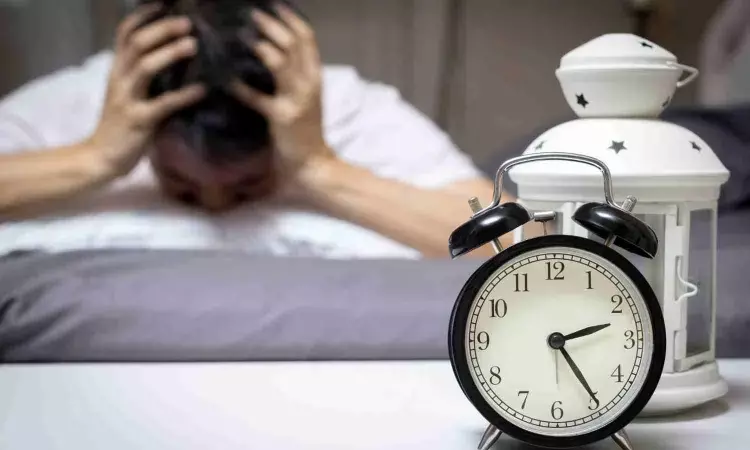- Home
- Medical news & Guidelines
- Anesthesiology
- Cardiology and CTVS
- Critical Care
- Dentistry
- Dermatology
- Diabetes and Endocrinology
- ENT
- Gastroenterology
- Medicine
- Nephrology
- Neurology
- Obstretics-Gynaecology
- Oncology
- Ophthalmology
- Orthopaedics
- Pediatrics-Neonatology
- Psychiatry
- Pulmonology
- Radiology
- Surgery
- Urology
- Laboratory Medicine
- Diet
- Nursing
- Paramedical
- Physiotherapy
- Health news
- Fact Check
- Bone Health Fact Check
- Brain Health Fact Check
- Cancer Related Fact Check
- Child Care Fact Check
- Dental and oral health fact check
- Diabetes and metabolic health fact check
- Diet and Nutrition Fact Check
- Eye and ENT Care Fact Check
- Fitness fact check
- Gut health fact check
- Heart health fact check
- Kidney health fact check
- Medical education fact check
- Men's health fact check
- Respiratory fact check
- Skin and hair care fact check
- Vaccine and Immunization fact check
- Women's health fact check
- AYUSH
- State News
- Andaman and Nicobar Islands
- Andhra Pradesh
- Arunachal Pradesh
- Assam
- Bihar
- Chandigarh
- Chattisgarh
- Dadra and Nagar Haveli
- Daman and Diu
- Delhi
- Goa
- Gujarat
- Haryana
- Himachal Pradesh
- Jammu & Kashmir
- Jharkhand
- Karnataka
- Kerala
- Ladakh
- Lakshadweep
- Madhya Pradesh
- Maharashtra
- Manipur
- Meghalaya
- Mizoram
- Nagaland
- Odisha
- Puducherry
- Punjab
- Rajasthan
- Sikkim
- Tamil Nadu
- Telangana
- Tripura
- Uttar Pradesh
- Uttrakhand
- West Bengal
- Medical Education
- Industry
Tai chi as good as talking therapy for managing chronic insomnia, suggests research

Tai chi, a form of mind-body exercise widely practiced in Chinese communities, has similar benefits to talking therapy for middle aged and older people with chronic insomnia, finds a trial from Hong Kong published by The BMJ today.
These results support the use of tai chi for the long term management of chronic insomnia in middle-aged and older adults, say the researchers.
Chronic insomnia is one of the most common sleep disorders in middle aged and older adults and has been linked to increased risks of cardiovascular diseases, mental disorders, and cognitive impairment.
Cognitive behavioural therapy (CBT) is the preferred treatment for chronic insomnia, but access is often limited by the high costs and low availability of therapists.
Previous studies have also shown benefits of tai chi in middle aged and older adults with insomnia, but direct comparisons with active treatments such as CBT are lacking.
To address this gap, researchers set out to assess whether tai chi is comparable (“non-inferior”) to cognitive behavioural therapy for insomnia (CBT-I) for managing chronic insomnia in middle aged and older adults.
Their findings are based on 200 Chinese adults aged 50 years or older diagnosed with chronic insomnia and enrolled at a research centre in Hong Kong between May 2020 and July 2022.
Participants were able to walk without assistance, were free of chronic conditions that may affect sleep, were not taking part in regular aerobic or mind-body exercise, had not received previous CBT-I treatment, and were not working shifts.
Participants were randomised to receive tai chi or cognitive behavioural therapy interventions for insomnia (CBT-I), consisting of one hour group sessions twice a week for a total of 24 sessions.
The Insomnia Severity Index (ISI) was used to assess change in perceived insomnia severity immediately after the 3-month interventions and at 12-month follow-up (month 15) by scoring symptoms such as difficulty falling and staying asleep, waking up too early and being unable to go back to sleep, and impact on daily life.
An ISI threshold of four points was used as the margin to assess non-inferiority.
At the start of the trial, both groups showed moderate levels of insomnia severity. At month 3, the tai chi group showed a reduction of 6.67 points in ISI scores, while the CBT-I group had a reduction of 11.19 points, resulting in a between group difference of 4.52. Tai chi was therefore deemed inferior to CBT-I at month 3 because the upper confidence limit exceeded the non-inferiority margin.
However, at month 15, the reductions for the tai chi and CBT-I groups were 9.51 and 10.18, respectively, with a between group difference of 0.68. At this point, tai chi was considered non-inferior to CBT-I because the upper limit fell within the non-inferiority margin.
Tai chi and CBT-I also had comparable benefits on subjective sleep parameters, quality of life, mental health, and physical activity level. No adverse events occurred during the intervention period.
The authors acknowledge that the positive effects of tai chi may be partially due to participants’ continued practice after the end of the interventions, and say further studies are needed to determine whether the benefits of tai chi can be applied to other countries or regions with different demographic characteristics.
However, they conclude: “Our study supports tai chi as an alternative treatment approach for the long term management of chronic insomnia in middle aged and older adults.”
Reference:
Siu P M, Yu D J, Yu A P, Recchia F, Li S X, Chan R N et al. Tai chi or cognitive behavioural therapy for treating insomnia in middle aged and older adults: randomised non-inferiority trial BMJ 2025; 391 :e084320 doi:10.1136/bmj-2025-084320
Dr Kamal Kant Kohli-MBBS, DTCD- a chest specialist with more than 30 years of practice and a flair for writing clinical articles, Dr Kamal Kant Kohli joined Medical Dialogues as a Chief Editor of Medical News. Besides writing articles, as an editor, he proofreads and verifies all the medical content published on Medical Dialogues including those coming from journals, studies,medical conferences,guidelines etc. Email: drkohli@medicaldialogues.in. Contact no. 011-43720751


